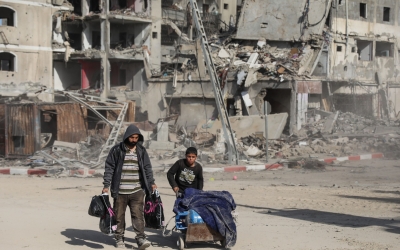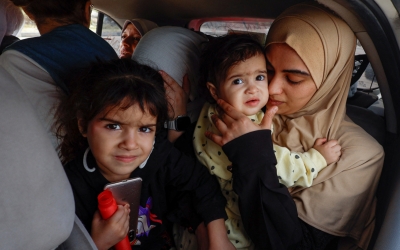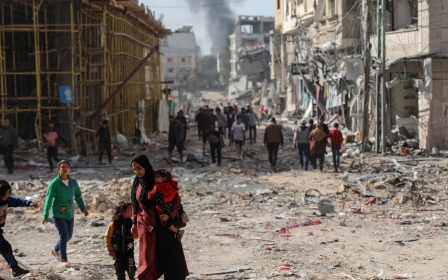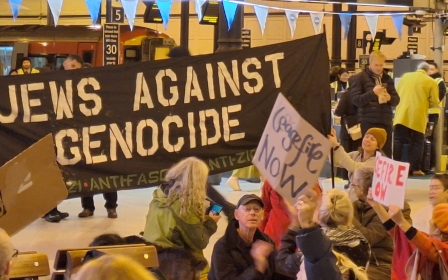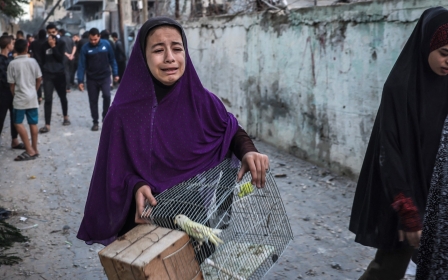Israel-Palestine war: How an encounter with Israeli soldiers in Gaza tore one family apart
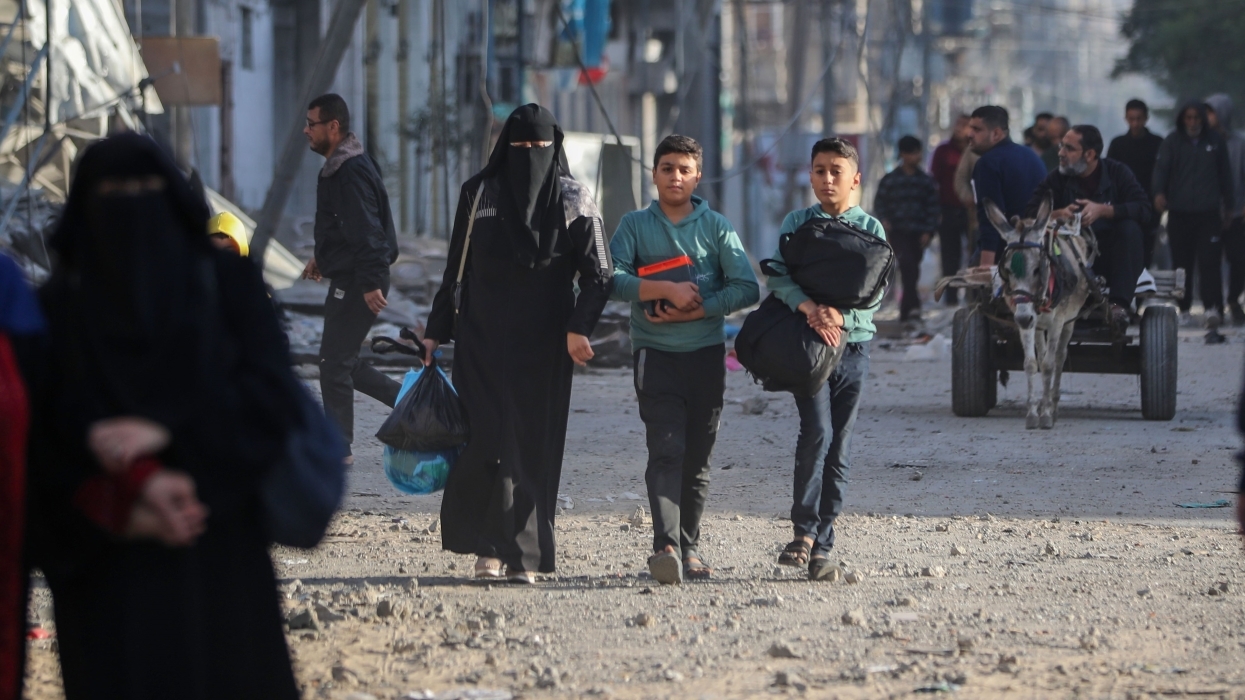
Like many Palestinians in Gaza, Roba Ziara and her family have been without a lasting sense of security since Israel’s bombardment of the besieged territory began after 7 October.
When Israel issued notice to residents of northern Gaza to head south, the family sought safety at a relative’s house in the Nuseirat refugee camp. However, an air strike targeted the area, killing Ziara’s cousin Dr Omar Ziara and injuring several other members of the family.
They then decided to turn back and return to their three-storey home in the al-Nasr neighbourhood of Gaza city.
It was a decision they felt they had little choice to make, but one that put them in the thick of the fighting after Israel’s ground invasion began.
“For the past few weeks, this area has been surrounded with belts of fire,” Ziara said.
New MEE newsletter: Jerusalem Dispatch
Sign up to get the latest insights and analysis on Israel-Palestine, alongside Turkey Unpacked and other MEE newsletters
That’s the term locals use to describe the relentless Israeli bombardment of the area, which is the current focus of their military campaign.
The family could not find safety within the walls of their home and venturing outside was too dangerous.
So they gathered in the centre of the house, as bullets pierced through its outer walls.
“We used to sleep in the middle of the house,” she said. “We could not sleep in the rooms. Drones operated overhead non-stop. The bullets were getting into the apartment.”
Little did the family know that the war was about to get a lot closer.
Red beams
At first members of the family noticed clouds of heavy smoke and then red beams of light characteristic of the equipment used by Israeli soldiers pierced through the gloom. Ziara said that she thought she was about to die.
The soldiers used explosives to breach the gate of the home, before proceeding forward to the first floor.
On the first floor, they encountered two of Ziara’s brothers-in-law and their wives, including one pregnant woman.
The soldiers questioned the group, before realising there were more people upstairs.
On the second floor, the soldiers found a male relative of Ziara’s, who they forced to strip, before posing with him with the Israeli flag placed in the background.
The top floor was where Ziara, her husband and several other relatives were staying.
Follow Middle East Eye's live coverage for the latest on the Israel-Palestine war
For each room they encountered, the soldiers used breach explosives, which terrified the children in the house.
According to Ziara, one relative, who suffered from epilepsy, began having seizures during the raid and was beaten by soldiers until he lost consciousness.
They forced him onto his stomach and put handcuffs tightly around his wrists, using their guns to strike at him. “We kept asking for them to leave him alone,” Ziara recalls.
Belts of fire
The family was then taken into the living room where they were interrogated in broken Arabic.
Ziara says that the family were accused of being members of Hamas, which they denied.
Some relatives tried to reason with the soldiers in Hebrew and English, explaining that they were civilians.
“My father-in-law speaks Hebrew and told them we are civilians. My sister-in-law told them in English,” she said, adding that the soldiers refused to take the denials seriously.
The family were asked why they did not travel south like they were ordered to, despite the fact that they had only returned to the north because they were bombed when they'd sought refuge.
Ziara recalled the soldiers using the family’s kitchen to make themselves cups of coffee while laughing at the distress she and her relatives were under.
She said the soldiers positioned a sniper within the building before taking the now blindfolded men to individual bedrooms for interrogation.
The family were then ordered to gather their belongings and head outside.
Women forced south, men arrested
Outside, the family saw tanks and Israeli bulldozers spread across the area. One brother-in-law was forcibly stripped in front of them.
Directed to a side door near an Unrwa school, they were separated by age and gender. The school's backyard was occupied by Israeli tanks.
There, they were photographed by Israeli soldiers. The women and children were sent to the south, while the men were detained for questioning.
Navigating through debris, the family witnessed the devastation along Nasr Street, once a bustling area, now strewn with corpses, pools of blood and destroyed shops.
Displaying a white flag whenever Israeli tanks appeared, they continued on to Wihda Street, encountering more tanks.
Reaching Rimal Street, they saw more tanks approaching with one gunner directing his weapon towards the group. The children started crying and the women raised a white flag, before they were ordered to go west through Abbas Street.
Encountering more tanks blocking the route, they sat on the ground in distress before returning to the earlier tank that directed them there.
Telling the soldiers about the ongoing gunfire coming from the tanks, they were directed along another route.
Navigating through smaller streets, they eventually found respite at a relative’s house on Talatini Street, where they were given water and a few dates.
The next day they made their way to the Kuwaiti intersection through the Israeli army’s safe corridor, where they were confronted by lines of Israeli bulldozers and tanks.
Ziara and her family saw streets lined with lifeless bodies, broken wheelchairs and decomposing animals.
She would see soldiers picking out people from the crowds, separating them from their families for arrest and interrogation.
“In one instance, they singled out a man wearing a red shirt, demanding that he abandon his wife and comply with their orders.” Ziara recalled.
Eventually making their way through to southern Gaza, the family’s attentions turned to their detained male relatives.
Through the help of legal organisations in Turkey and Israel, Ziara found out that most had been taken out of Gaza by the Israelis to a prison in the Negev region.
At the prison, they experienced brutal mistreatment, according to Ziara.
“They were subjected to relentless beatings and abuse, as well as cruel acts of violence,” she said, adding that they were left exposed to the elements, including heavy rain.
Nevertheless, she is grateful that their fate, at least, is known. Her husband’s whereabouts remain unknown, except to the Israelis.
“We still do not know the fate of my husband,” Ziara said. “I feel like what we lived was too much (emotionally). My children are still afraid. They ask me about their father every day.”
Middle East Eye delivers independent and unrivalled coverage and analysis of the Middle East, North Africa and beyond. To learn more about republishing this content and the associated fees, please fill out this form. More about MEE can be found here.


